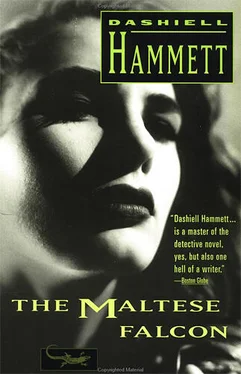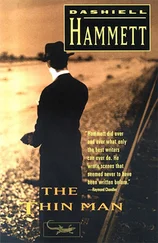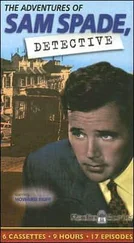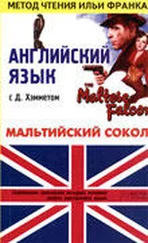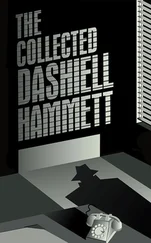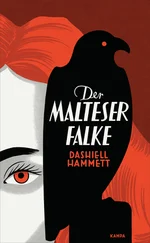"I did not know," she said.
Spade scowled at the ashes he had dumped on his plate. "What makes it worth all that money?" he demanded. "You must have some idea, at least be able to guess."
"I haven't the slightest idea."
He directed the scowl at her. "What's it made of?"
"Porcelain or black stone. I don't know. I've never touched it. I've only seen it once, for a few minutes. Floyd showed it to me when we'd first got hold of it."
Spade mashed the end of his cigarette in his plate and made one draught of the coffee and brandy in his cup. His scowl had gone away. He wiped his lips with his napkin, dropped it crumpled on the table, and spoke casually: "You are a liar."
She got up and stood at the end of the table, looking down at him with dark abashed eyes in a pinkening face. "I am a liar," she said. "I have always been a liar."
"Don't brag about it. It's childish." His voice was good-humored. He came out from between table and bench. "Was there any truth at all in that yarn?"
She hung her head. Dampness glistened on her dark lashes. "Some," she whispered.
"How much?"
"Not—not very much."
Spade put a hand under her chin and lifted her head. He laughed into her wet eyes and said: "We've got all night before us. I'll put some more brandy in some more coffee and we'll try again."
Her eyelids drooped. "Oh, I'm so tired," she said tremulously, "so tired of it all, of myself, of lying and thinking up lies, and of not knowing what is a lie and what is the truth. I wish I—"
She put her hands up to Spade's cheeks, put her open mouth hard against his mouth, her body flat against his body.
Spade's arms went around her, holding her to him, muscles bulging his blue sleeves, a hand cradling her head, its fingers half lost among red hair, a hand moving groping fingers over her slim back. His eyes burned yellowly.
Beginning day had reduced night to a thin smokiness when Spade sat up. At his side Brigid O'Shaughnessy's soft breathing had the regularity of utter sleep. Spade was quiet leaving bed and bedroom and shutting the bedroom-door. He dressed in the bathroom. Then he examined the sleeping girl's clothes, took a flat brass key from the pocket of her coat, and went out.
He went to the Coronet, letting himself into the building and into her apartment with the key. To the eye there was nothing furtive about h'is going in: he entered boldly and directly. To the ear his going in was almost unnoticeabhe: he made as little sound as might be.
In the girl's apartment he switched on all the lights. He searched the place from wall to wall. His eyes and thick fingers moved without apparent haste, and without ever lingering or fumbling or going back, from one inch of their fields to the next, probing, scrutinizing, testing with expert certainty. Every drawer, cupboard, cubbyhole, box, bag, trunk—locked or unlocked—was opened and its contents subjected to examination by eyes and fingers. Every piece of clothing was tested by hands that felt for telltale bulges and ears that listened for the crinkle of paper between pressing fingers. He stripped the bed of bedclothes. He looked under rugs and at the under side of each piece of furniture. He pulled down blinds to see that nothing had been rolled up in them for concealment. He leaned through windows to see that nothing hung below them on the outside. He poked with a fork into powder and cream-jars on the dressing-table. He held atomizers and bottles up against the light. He examined dishes and pans and food and food-containers. He emptied the garbage-can on spread sheets of newspaper. He opened the top of the flush-box in tIme bathroom, drained the box, and peered down into it. He examined and tested the metal screens over the drains of bathtub, wash-bowl, sink, and laundry tub.
He did not find the black bird. He found nothing that seemed to have any connection with a black bird. The only piece of writing he found was a week-old receipt for the month's apartment-rent Brigid O'Shaughnessy had paid. The only thing he found that interested him enough to delay his search while he hooked at it was a double-handful of rather fine jewelry in a polychrome box in a lockel dressing-table-drawer.
When he had finished he made and drank a cup of coffee. Then he unlocked the kitchen-window, scarred the edge of its hock a little with his pocket-knife, opened the window—over a fire-escape—got his hat and overcoat from the settee in the living-room, and left the apartnient as he had come.
On his way home he stopped at a store that was being opened by a puffy-eyed shivering plump grocer amid bought oranges, eggs, rolls, butter, and cream.
Spade went quietly into his apartment, but before he had shut the corridor-door behind him Brigid O'Shaughnessy cried: "Who is that?"
"Young Spade bearing breakfast."
"Oh, you frightened me!"
The bedroom-door he had shut was open. The girl sat on the side of the bed, trembling, with her right hand out of sight under a pillow'.
Spade put his packages on the kitchemi-table and went into the bedroom. He sat on the bed beside the girl, kissed her smooth shoulder, and said: "I wanted to see if that kid was still on the job, and to get stuff for breakfast."
"Is he?"
"No."
She sighed and leaned against him. "I awakened and you weren't here and then I heard someone coming in. I was terrified."
Spade combed her red hair back from her face with his fingers and said: "I'm sorry, angel. I thought you'd sleep through it. Did you have that gun under your pillow all night?"
"No. You know I didn't. I jumped up and got it when I was frightened."
He cooked breakfast—and slipped the flat brass key into her coatpocket again—while she bathed and dressed.
She came out of the bathroom whistling En Cuba. "Shall I make the bed?" she asked.
"That'd be swell. The eggs need a couple of minutes more."
Their breakfast was on the table when she returned to the kitchen. They sat where they had sat the night before and ate heartily.
"Now about the bird?" Spade suggested presently as they ate.
She put her fork down and looked at him. She drew her eyebrows together and made her mouth small and tight. "You can't ask me to talk about that this morning of all mornings," she protested. "I don't want to and I won't."
"It's a stubborn damned hussy," he said sadly and put a piece of roll into his mouth.
The youth who had shadowed Spade was not in sight when Spade and Brigid O'Shaughnessy crossed the sidewalk to the waiting taxicab. The taxicab was not followed. Neither the youth nor another loiterer was visible in the vicinity of the Coronet when the taxicab arrived there.
Brigid O'Shaughnessy would not let Spade go in with her. "It's bad enough to be coming home in evening dress at this hour without bringing company. I hope I don't meet anybody."
"Dinner tonight?"
"Yes."
They kissed. She went into the Coronet. He told the chauffeur: "Hotel Belvedere."
When he reached the Belvedere he saw the youth who had shadowed him sitting in the lobby on a divan from which the elevators could be seen. Apparently the youth was reading a newspaper.
At the desk Spade learned that Cairo was not in. He frowned and pinched his lower lip. Points of yellow light began to dance in his eyes. "Thanks," he said softly to the clerk and turned away.
Sauntering, he crossed the hobby to the divan from which the ehevatons could be seen and sat down beside—not more than a foot from—the young man who was apparently reading a newspaper.
The young man did not look up from his new'spaper. Seen at this scant distance, he seemed certainly less than twenty years old. His features were small, in keeping with his stature, and regular. His skin was very fair. The whiteness of hus cheeks was as little blurred by any considerable growth of beard as by the glow of blood. His clothing was neither new nor of more than ordinary quality, but it, and his manner of wearing it, was marked by a hard masculine neatness.
Читать дальше
